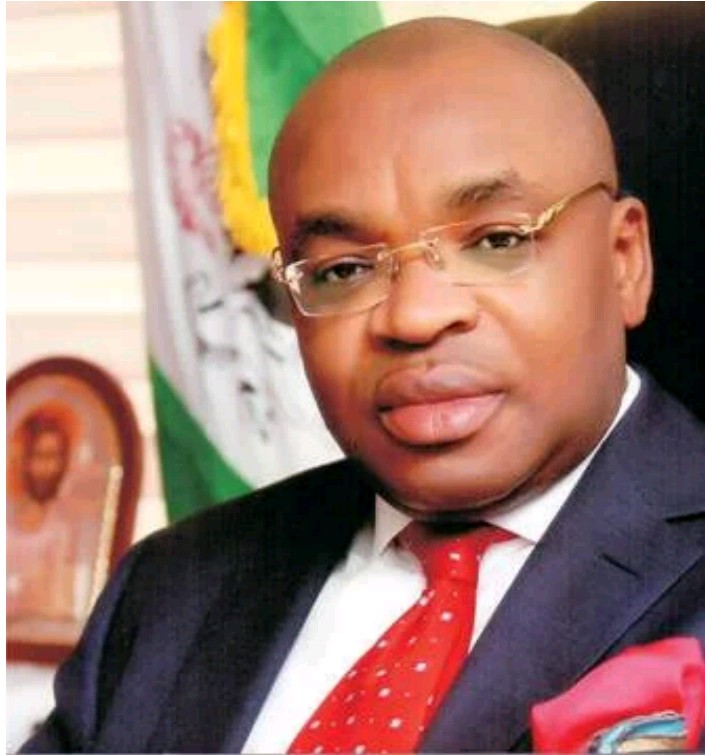Understanding Akwa Ibom’s 2019 Budget (1)
By: Otobong Sampson, Uyo
November 19, 2018
Christened ‘Budget of Industrialization and Poverty Alleviation,’ Akwa Ibom Governor, Mr. Udom Emmanuel on Wednesday, November 14, 2018 laid out his administration’s plans for the state for the 2019 fiscal year. A total of 670.718 billion naira is the proposed budget size. 445.936 billion naira is earmarked for capital expenditure, Consolidated Revenue Fund Charges is pegged at 127.686 billion naira while recurrent expenditure will take 97.096 billion naira.

Gov. Udom
The budget is set with projection at sixty dollar per barrel international oil price, production rate of 2.3million barrels per day and a forecasted exchange rate of 305 naira to one US dollar. This is in alignment with the computations of National Budget Benchmark. Between November 5 and 11, oil price in the international market fluctuated between the opening prices of 56.02 dollar and 62.99 while closing prices were between 56.46 and 63.10. So 60 is a decent projection even with surging market volatility.
The Industrialization and Poverty Alleviation Budget guided by the International Public Sector Account (IPSAS) could not have come at a better time. It seeks basically to build on the economic momentum of the moment and to consolidate on the huge gains of the last three-plus years. The 2019 budget is expected to concretize government industrialization efforts, create more jobs and drive the policy to a logical conclusion.
In line with the administration’s five point agenda, the estimates indicate a bold resolve to reduce poverty levels, stimulate wealth creation and generate employment opportunities. The gap between capital expenditures and recurrent can only mean one thing: the administration is navigating the steering of development in the right direction.
Agriculture will play a vital role in the success of the 2019 budget. The sector is to enjoy generous funding with the sum of 13.064 billion naira. The expansion of this sector by the Udom administration has contributed in no small measure to the industrial growth of the state and its blossoming economic activities.
In Nigeria, agriculture still leads in sectoral ranking and remains the biggest labour employer. In Akwa Ibom, about 75% of the people either live on or are supported by agricultural endeavours in an economy that’s largely agro-based. Government has made conscious efforts and developed sustainable strategies to re-direct the state’s focus away from crude oil to agriculture. From cocoa, rice, tomato and cucumber cultivation; the coconut plantation for its oil, animal production and husbandry and several others, government is making the sector both attractive and rewarding.
For health, the 18.021 billion proposed sum validates the assertion that the governor has given special attention to the health needs of his people since he assumed office in 2015. It is a significant increase from last year’s 8.210 billion naira budget.
It is important to state that the administration runs free medical services for children under the age of five and for pregnant women too. There are other myriad intervention actions by government.
Recently, the governor inaugurated a 88year old hitherto abandoned general hospital in Ituk Mbang, Uruan. This action was quickly followed by an equally tastefully renovated and well equipped general hospital in Oruk Anam. So far, five general hospitals including St. Luke in Anua, Etinan General Hospital and Ikono General Hospital have been resuscitated to function maximally with state-of-the-art medical equipments to meet the health needs of the people both in the rural areas and urban centres.
The hospital in Uruan, fully digitalized like the others, has the biggest accident and emergency department because of its proximity to the state capital. Other such centres are undergoing renovation and rehabilitation in Ikot Okoro, Eket; Okobo and Oron.
A saying goes: health is wealth! This understanding has ensured the present administration continues to develop and implement programmes and policies, as well as, undertaking other necessary actions that will further enhance the state healthcare delivery system for effective, efficient, affordable and even free health services.
The education sector will enjoy more funding too with an increase of about five billion naira compared to 2018. While the government has shown sufficient commitment in this sector, it understandably faces new, rising challenges. It has remain undaunted in conquering these challenges, however.
From infrastructures to teaching personnel; training and re-training of educators; facilities, equipments and materials that drive 21st century education, the sector has witnessed monumental strides under Governor Emmanuel.
The days ahead can expectedly be brighter in a state in which over 450 public schools have been renovated and completely transformed, over 5000 new teachers employed and free education offered, including payment of WAEC fees for students, that gulp more than 600million naira yearly.
Education is the driver of modern development and builder of societies. This explains why Governor Emmanuel has committed so much resources into the foundational education of Akwa Ibom’s future leaders as well as investing significantly in state-owned higher institutions. These include; Akwa Ibom State University, Akwa Ibom State Polytechnic, and College of Education, Afaha Nsit. Only recently, the Afaha Nsit College became a degree awarding institution.







All Comments